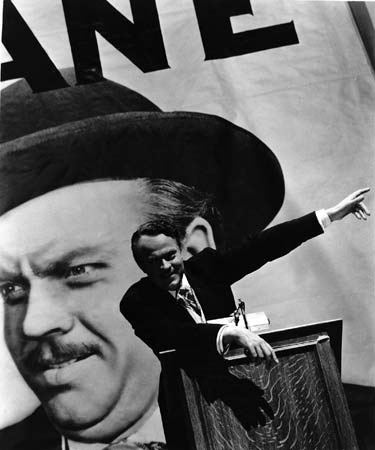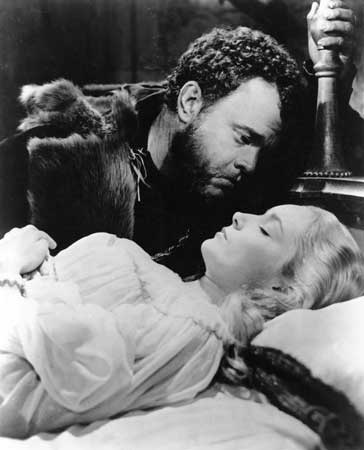Welles, Orson
American actor, director and writer
in full George Orson Welles
born May 6, 1915, Kenosha, Wisconsin, U.S.
died October 10, 1985, Los Angeles
 American motion-picture actor, director, producer, and writer. His innovative narrative techniques and use of photography, dramatic lighting, and music to further the dramatic line and to create mood combined to make his Citizen Kane (1941)—which he wrote, directed, produced, and acted in—one of the most influential films in the history of the art.
American motion-picture actor, director, producer, and writer. His innovative narrative techniques and use of photography, dramatic lighting, and music to further the dramatic line and to create mood combined to make his Citizen Kane (1941)—which he wrote, directed, produced, and acted in—one of the most influential films in the history of the art.From his progressive mother (a pianist and crack shot with a rifle), Welles learned to play the piano and the violin. His parents separated when he was six years old, and his mother died when he was eight. Through his father, a successful inventor and manufacturer, who died when his son was 13, Welles met actors and sportsmen. By the time he was 11, Welles had traveled around the world twice. He attended the Todd School for Boys in Woodstock, Illinois, where he was an indifferent student but learned much about dramatics. He studied briefly at the Art Institute of Chicago and worked as a reporter before going to Ireland, where he made a sketching tour by donkey cart. His stage debut was made at the Gate Theatre, Dublin, in the autumn of 1931, where he acted in Hamlet. Welles remained in Ireland for a year, acting with the Abbey Players as well as at the Gate. After a tour of Spain and Morocco, he returned to Chicago and then toured with Katharine Cornell (Cornell, Katharine)'s company in 1933–34, playing Mercutio in Romeo and Juliet, Marchbanks in Candida, and Octavius Barrett in The Barretts of Wimpole Street. In 1934 he organized a drama festival at Woodstock, where he played Hamlet. He made his New York debut as Tybalt in Romeo and Juliet in December 1934. Welles was the director of an all-black cast in Macbeth for the Negro People's Theatre, a part of the Federal Theatre Project (WPA Federal Theatre Project), in 1936. In 1937 he formed the Mercury Theatre, which presented a renowned modern-dress version of Shakespeare's Julius Caesar.
His radio career began early in 1934 in an adaptation of the poet Archibald MacLeish's verse play Panic. In 1934–35 he narrated The March of Time news series, and subsequent radio roles included the part of Lamont Cranston in the mystery series The Shadow. In 1938 the Mercury players undertook a series of radio dramas adapted from famous novels. They attained national notoriety with the program based on H.G. Wells's War of the Worlds; the performance on October 30, 1938, using the format of a simulated news broadcast, announced an attack on New Jersey by invaders from Mars. Thousands of listeners, not realizing the announcement was a simulation, were panic-stricken.

 In 1940 Welles, on contract to RKO, went to Hollywood and made the classic film Citizen Kane (1941), which portrayed the life of a newspaper magnate (suggestive of William Randolph Hearst, who sought to ban the movie), and The Magnificent Ambersons (1942), a screen version of Booth Tarkington's novel of the same name. Welles directed and starred in The Stranger (1946), The Lady from Shanghai (1947), and Macbeth (1948). He then lived for several years in Europe, where he produced, directed, and acted in Othello (1952) and Mr. Arkadin (1955). He returned to Hollywood to direct and perform in Touch of Evil (1958), then went back to Europe for Le Procès (1962; The Trial) and Campanadas a medianoche (1966; Chimes at Midnight). In 1974 he wrote, directed, and acted in the highly original F for Fake.
In 1940 Welles, on contract to RKO, went to Hollywood and made the classic film Citizen Kane (1941), which portrayed the life of a newspaper magnate (suggestive of William Randolph Hearst, who sought to ban the movie), and The Magnificent Ambersons (1942), a screen version of Booth Tarkington's novel of the same name. Welles directed and starred in The Stranger (1946), The Lady from Shanghai (1947), and Macbeth (1948). He then lived for several years in Europe, where he produced, directed, and acted in Othello (1952) and Mr. Arkadin (1955). He returned to Hollywood to direct and perform in Touch of Evil (1958), then went back to Europe for Le Procès (1962; The Trial) and Campanadas a medianoche (1966; Chimes at Midnight). In 1974 he wrote, directed, and acted in the highly original F for Fake.Welles also appeared as an actor in many other films, including Jane Eyre (1944), The Third Man (1949), The Long, Hot Summer (1958), Compulsion (1959), A Man for All Seasons (1966), and Catch-22 (1970). His later stage work included the title roles in Othello (London, 1951) and King Lear (New York City, 1956).
Additional Reading
Biographies and critical studies include Joseph McBride, Orson Welles (1972, reissued 1996); Barbara Leaming, Orson Welles (1985, reissued 1995); Simon Callow, Orson Welles (1995– ); Ronald Gottesman (ed.), Focus on Orson Welles (1976); Richard France, The Theatre of Orson Welles (1977); and Richard France (ed.), Orson Welles on Shakespeare: The W.P.A. and Mercury Theatre Playscripts (1990).
- Rauschenberg, Robert
- Rauschenbusch, Walter
- Rauscher, Joseph Othmar von
- Rau, Sir Benegal Narsing
- Rauvolfia
- Ravaisson-Mollien, Jean-Gaspard-Félix Lacher
- Ravel, Maurice
- raven
- Raven cycle
- Ravenna
- Ravensbrück
- Ravensburg
- Ravenscroft, George
- Ravenscroft, Thomas
- Raven, Simon
- Ravidas
- Ravinia Park
- Ravi Shankar
- Rawalpindi
- Rawlings, Jerry J.
- Rawlings, Marjorie Kinnan
- Rawlins
- Rawlinson, Sir Henry Creswicke
- Rawls, Betsy
- Rawls, John